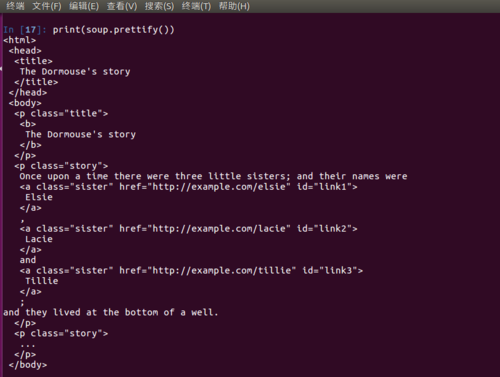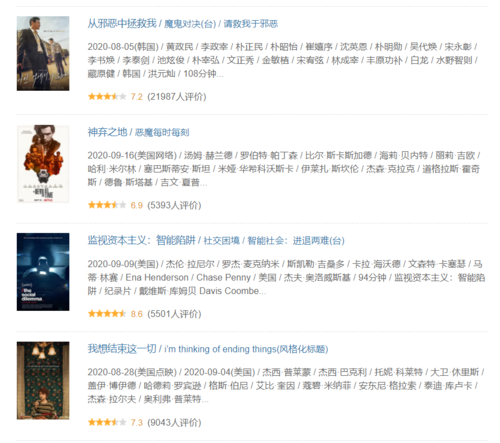CSS Selector
CSS(即层叠样式表Cascading Stylesheet),
Selector来定位(locate)页面上的元素(Elements)。Selenium官网的Document里极力推荐使用CSS locator,而不是XPath来定位元素,原因是CSS locator比XPath locator速度快.
Beautiful Soup
-
支持从HTML或XML文件中提取数据的Python库
-
支持Python标准库中的HTML解析器
-
还支持一些第三方的解析器lxml, 使用的是 Xpath 语法,推荐安装。
Beautiful Soup自动将输入文档转换为Unicode编码,输出文档转换为utf-8编码。你不需要考虑编码方式,除非文档没有指定一个编码方式,这时,Beautiful Soup就不能自动识别编码方式了。然后,你仅仅需要说明一下原始编码方式就可以了
-
Beautiful Soup4 安装
官方文档链接:
可以利用 pip来安装
pip install beautifulsoup4
- 安装解析器(上节课已经安装过)
pip install lxml
-
Beautiful Soup支持Python标准库中的HTML解析器,还支持一些第三方的解析器,其中一个是 lxml .根据操作系统不同,可以选择下列方法来安装lxml:
另一个可供选择的解析器是纯Python实现的 html5lib , html5lib的解析方式与浏览器相同,可以选择下列方法来安装html5lib:
pip install html5lib
下表列出了主要的解析器:
| 解析器 | 使用方法 | 优势 | 劣势 |
|---|---|---|---|
| Python标准库 | BeautifulSoup(markup, “html.parser”) | Python的内置标准库;执行速度适中;文档容错能力强 | Python 2.7.3 or 3.2.2前 的版本中文档容错能力差 |
| lxml HTML 解析器 | BeautifulSoup(markup, “lxml”) | 速度快;文档容错能力强 ; | 需要安装C语言库 |
| lxml XML 解析器 | BeautifulSoup(markup, [“lxml-xml”]) BeautifulSoup(markup, “xml”) | 速度快;唯一支持XML的解析器 | 需要安装C语言库 |
| html5lib | BeautifulSoup(markup, “html5lib”) | 最好的容错性;以浏览器的方式解析文档;生成HTML5格式的文档 | 速度慢;不依赖外部扩展 |
推荐使用lxml作为解析器,因为效率更高. 在Python2.7.3之前的版本和Python3中3.2.2之前的版本,必须安装lxml或html5lib**, 因为那些Python版本的标准库中内置的HTML解析方法不够稳定.**
- 快速开始
html_doc ="""
The Dormouse's story<p class="title"><b>The Dormouse's story</b></p>
<p class="story">Once upon a time there were three little sisters; and their names were
<a href="http://example.com/elsie" class="sister">Elsie</a>,
<a href="http://example.com/lacie" class="sister">Lacie</a> and
<a href="http://example.com/tillie" class="sister">Tillie</a>;
and they lived at the bottom of a well.</p>
<p class="story">...</p>
"""
使用BeautifulSoup解析这段代码,能够得到一个 BeautifulSoup 的对象**,并能按照标准的缩进格式的结构输出:**
from bs4 import BeautifulSoup soup = BeautifulSoup(html_doc,'lxml')
下面我们来打印一下 soup 对象的内容
print (soup)
格式化输出soup 对象
print(soup.prettify())
CSS选择器
在写 CSS 时:
标签名不加任何修饰 类名前加点 id名前加 #
利用类似的方法来筛选元素,用到的方法是 soup.select(),返回类型是 list
- 通过标签名查找
print (soup.select('title') )
#[The Dormouse's story]
print (soup.select('a'))
#[<a class="sister" href="http://example.com/elsie"></a>, <a class="sister" href="http://example.com/lacie">Lacie</a>, <a class="sister" href="http://example.com/tillie">Tillie</a>]
print (soup.select('b'))
#[<b>The Dormouse's story</b>]
- 通过类名查找
print (soup.select('.sister'))
# [<a class="sister" href="http://example.com/elsie"></a>, <a class="sister" href="http://example.com/lacie">Lacie</a>, <a class="sister" href="http://example.com/tillie">Tillie</a>]
- 通过 id 名查找
print(soup.select('#link1'))
# [<a class="sister" href="http://example.com/elsie"></a>]
- 直接子标签查找
print (soup.select("head > title"))
#[The Dormouse's story]
-
组合查找
组合查找即标签名与类名、id名进行的组合原理是一样的,例如查找 p 标签中,id 等于 link1的内容,
属性和标签不属于同一节点 二者需要用空格分开
print (soup.select('p #link1'))
#[<a class="sister" href="http://example.com/elsie"></a>]
-
属性查找
查找时还可以加入属性元素,属性需要用中括号括起来
注意属性和标签属于同一节点,所以中间不能加空格,否则会无法匹配到
print (soup.select('a[class="sister"]'))
#[<a class="sister" href="http://example.com/elsie"></a>, <a class="sister" href="http://example.com/lacie">Lacie</a>, <a class="sister" href="http://example.com/tillie">Tillie</a>]
print (soup.select('a[href="http://example.com/elsie"]'))
#[<a class="sister" href="http://example.com/elsie"></a>]
同样,属性仍然可以与上述查找方式组合,不在同一节点的空格隔开,同一节点的不加空格
print (soup.select('p a[href="http://example.com/elsie"]'))
#[<a class="sister" href="http://example.com/elsie"></a>]
以上的 select 方法返回的结果都是列表形式,可以遍历形式输出
用 get_text() 方法来获取它的内容。
print(soup.select('title')[0].get_text() )
for title in soup.select('title'):
print (title.get_text())
Tag
Tag 是什么?通俗点讲就是 HTML 中的一个个标签,例如
<a class="sister" href="http://example.com/elsie">Elsie</a>
print type(soup.select('a')[0])
输出:
bs4.element.Tag
对于 Tag,它有两个重要的属性,是 name 和 attrs,下面我们分别来感受一下
- name
print (soup.name) print (soup.select('a')[0].name)
输出:
[document] 'a'
soup 对象本身比较特殊,它的 name 即为 [document],对于其他内部标签,输出的值便为标签本身的名称。
- attrs
print (soup.select('a')[0].attrs)
输出:
{'href': 'http://example.com/elsie', 'class': ['sister'], 'id': 'link1'}
在这里,我们把 soup.select(‘a’)[0] 标签的所有属性打印输出了出来,得到的类型是一个字典。
如果我们想要单独获取某个属性,可以这样,例如我们获取它的 class 叫什么
print (soup.select('a')[0].attrs['class'])
输出:
['sister']
实战
爬取豆瓣电影排行榜案例
from bs4 import BeautifulSoup
import urllib.parse
import urllib.request
url='https://movie.douban.com/chart'
# 豆瓣排行榜
herders={'User-Agent':'Mozilla/5.0 (Windows NT 10.0; Win64; x64) AppleWebKit/537.36 (KHTML, like Gecko) Chrome/85.0.4183.102 Safari/537.36', 'Referer':'https://movie.douban.com/','Connection':'keep-alive'}
# 请求头信息
req = urllib.request.Request(url,headers=herders)
# 设置请求头
response=urllib.request.urlopen(req)
# response 是返回响应的数据
htmlText=response.read()
# 读取响应数据
# 把字符串解析为html文档
html = BeautifulSoup(htmlText,'lxml')
result = html.select(".pl2")
file = open('data.txt','a',encoding='utf-8')
# 打开一个文本文件
# 遍历几个
for item in result:
str = ''
#声明一个空的字符串
str += item.select('a')[0].get_text().replace(' ','').replace("\n","")
# 获取标题文字.替换掉空格.替换掉换行
str += '('
# 给评分加个左括号
str += item.select('.rating_nums')[0].get_text()
# 获取评分
str += ')\n'
# 给评分加个右括号
print(str)
# 在控制台输出内容
file.write(str)
# 写入文件
file.close()
# 关闭文件
结果
从邪恶中拯救我/魔鬼对决(台)/请救我于邪恶(7.2)
神弃之地/恶魔每时每刻(6.9)
监视资本主义:智能陷阱/社交困境/智能社会:进退两难(台)(8.6)
我想结束这一切/i’mthinkingofendingthings(风格化标题)(7.3)
禁锢之地/Imprisonment/TheTrapped(4.4)
鸣鸟不飞:乌云密布/SaezuruToriWaHabatakanai:TheCloudsGather(8.3)
树上有个好地方/TheHomeintheTree(7.9)
辣手保姆2:女王蜂/撒旦保姆:血腥女王/TheBabysitter2(5.7)
冻结的希望/雪藏希望:待日重生/HopeFrozen:AQuestToLiveTwice(8.1)
铁雨2:首脑峰会/铁雨2:首脑会谈/钢铁雨2:核战危机(港)(5.8)
单词表
"""
单词表
Beautiful 美丽的
Soup 汤
url 统一资源定位器
lib library 库
parse 解析
request 解析
respone 响应
select 选择
open 打开
encoding 编码
get_text 获取文本
write 写
close 关闭
问题?
好,这就是另一种与 XPath 语法有异曲同工之妙的查找方法,觉得哪种更方便?
共同学习,写下你的评论
评论加载中...
作者其他优质文章








